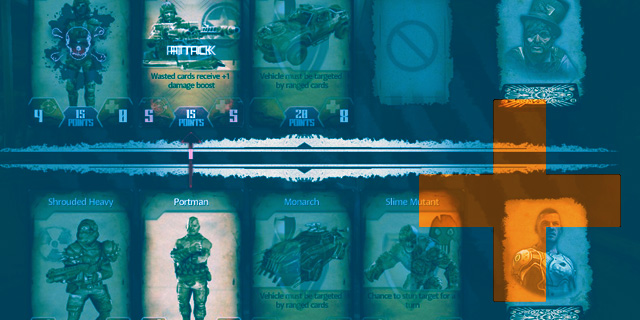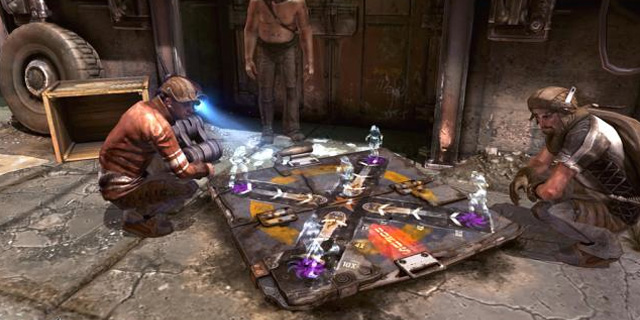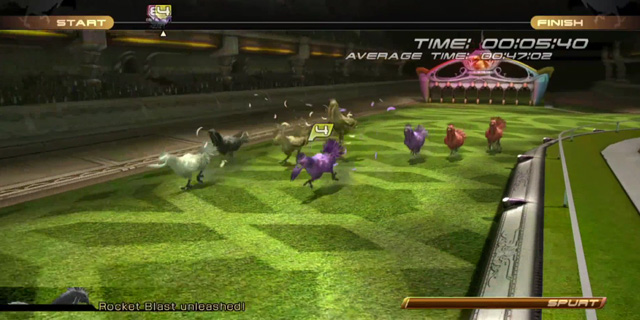
Thanks to the popularity of such motion-based systems like the Wii and the 360’s Kinect, “minigame” has almost become a dirty term in the industry. You think of Wii Play, Carnival Games or one of the hundred other minigame collections that have come out over the years and plagued us with their tedious mechanics and uninspired gameplay. Not all minigame collections are bad, but most have been pushed out to make a quick buck off the gimmicks of these new control devices. In light of these releases, I want to show that minigames still have a place in the industry, and can potentially be our hope and saviors from potentially monotonous gameplay.
I’m not going to talk about minigame collections, but instead discuss minigames in general and their function in games. I recently had the chance to replay Final Fantasy VII, a classic RPG that redefined the genre in the west and opened it up to a whole new audience. Needless to say, I love that game and think it is worthy of the praise it has received, but one of the things that helped define it as a memorable experience was the use of minigames. While some consider these filler or exercises in tedium, I consider them highly original, enjoyable breaks from the rest of the game.

At many points during FFVII, you were made to take part in a specific gameplay section or minigame that was completely unlike the rest of the game. Some of these sections were quick, simple ways to break up the gameplay in an attempt to keep things interesting, while others were fully-fledged minigames with real replay value. Chocobo races, snowboarding, a decently designed strategy game and more were all small components that really fit the game’s world like a glove, and they were part of the reason that helped the game stick out in my mind so many years later. Some work better than others, sure, but back in those days, going to the Gold Saucer was more fun than our current idea of minigame collections.
But that was quite a while ago. Standards have changed, and some say we are better off without minigames interrupting the flow of gameplay. Final Fantasy XIII was the first game in the series to move away from minigames in favor of a strict, focused experience. Thanks to the reaction to that (as well as to FFXIII’s many other problems), we now have Final Fantasy XIII-2, which brought back the minigames. I can’t speak to how well they were implemented, but it shows that they do have a place in that series, at least according to the fans.
Let’s take a look at last year’s Rage, a game that was absolutely full of unmemorable moments. If you wanted, you could have spent your entire time in the game’s wasteland just going through the main story missions, most of which involve shooting people in the face. As a result, your experience would have been rather tedious. If you take the time to play a few of Rage’s simplistic-but-well-designed minigames, you might find yourself having more of a good time. The games weren’t perfect, but they added something to the formula that kept it from becoming monotonous or feeling lifeless. At the same time, the minigames were almost entirely optional, allowing those who wish to avoid them to do so.

For me, the most enjoyable experiences from Rage are playing those minigames. Whenever I found myself focusing too much on the main story, I began to get tired of the gameplay. I then rushed into town and decided to participate in a local race or try my hand at the excellent card game just to keep myself motivated to continue. I found myself more invested in the side content than the actual core mechanics of the game. If done well, minigames can make average games a little more memorable. Of course, they can also make great games even greater.
On the other hand, minigames can become that source of monotony for players if they are forced into them. Not everyone loves the minigames in the Final Fantasy series because not all of them are winners, and sometimes they are thrown into the gameplay for no good reason (Blitzball from Final Fantasy X comes to mind immediately). The idea of keeping some focus of your game on minigames can backfire entirely, especially if you plan on integrating them into the main game. You want to make these moments the time for players to kick back and enjoy something a little different; they should never be moments of stress or tedium just to add something new to the gameplay.

This all ties together with a game’s pacing. If you have a 40-hour RPG, sprinkling in a few minigames here and there in the right places will help tremendously. Throw them in when you reach a spot in the story when everything is calm, and also give players a chance to return to them whenever they want. Make it so they can win prizes; give them motivation to come back without the game even forcing them to do so. RPGs have plenty of room for these moments, but so do open-world games like Rage or even Rockstar’s games, such as Red Dead Redemption and the Grand Theft Auto series. They have a place in games today; they just have to be integrated well enough to not feel out of place.
On the other hand, 6-hour FPS campaigns probably should refrain from including these. They should be tight and keep things interesting enough from moment to moment that adding another layer on top of that would be unnecessary. And since we’re seeing more games like this, more linear and focused with an emphasis on multiplayer, minigames have less of a place than they used to. That being said, there are plenty of games that can benefit from them, even if those games are growing fewer by the day.
I love minigames, and I think they still have a place in the gaming industry. I don’t want another minigame compilation, and I don’t want them to ever ruin the pacing of an excellent adventure, but they still can feel right at home with certain games. Sometimes I feel like the industry as a whole has lost sight of this; it’s a result of gaming, as a whole, becoming less varied. But if minigames can make an entirely forgettable experience like Rage seem a little more memorable, then they can be beneficial to games as a whole.



















